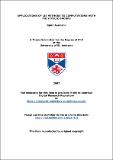Applications of Lie methods to computations with polycyclic groups
Abstract
In this thesis we demonstrate the algorithmic usefulness of the so-called
Mal'cev correspondence for computations with infinite polycyclic groups.
This correspondence between Q-powered nilpotent groups and rational nilpotent
Lie algebras was discovered by Anatoly Mal'cev in 1951.
We show how the Mal'cev correspondence can be realized on a computer.
We explore two possibilities for this purpose and compare them: the first
one uses matrix embeddings and the second the Baker-Campbell-Hausdorff
formula.
Then, we describe a new collection algorithm for polycyclically presented
groups, which we call Mal'cev collection. Algorithms for collection lie at the
heart of most methods dealing with polycyclically presented groups. The
current state of the art is "collection from the left" as recently studied by
Gebhardt, Leedham-Green/Soicher and Vaughan-Lee. Mal'cev collection is
in some cases dramatically faster than collection from the left, while using
less memory.
Further, we explore how the Mal'cev correspondence can be used to describe
symbolically the collection process in polycyclically presented groups.
In particular, we describe an algorithm that computes the collection functions
for splittable polycyclic groups. This algorithm is based on work by du Sautoy. We apply it to the computation of pro-p-completions of polycyclic
groups.
Finally we describe a practical algorithm for testing polycyclicity of finitely
generated rational matrix groups. Previously, not only did no such method
exist but it was not clear whether this question was decidable at all.
Most of the methods described in this thesis are implemented in the
computer algebra system GAP and publicly available as part of the GAP
packages Guarana and Polenta. Reports on the implementation including
runtimes for some examples are given at the appropriate places.
Type
Thesis, PhD Doctor of Philosophy
Collections
Items in the St Andrews Research Repository are protected by copyright, with all rights reserved, unless otherwise indicated.

